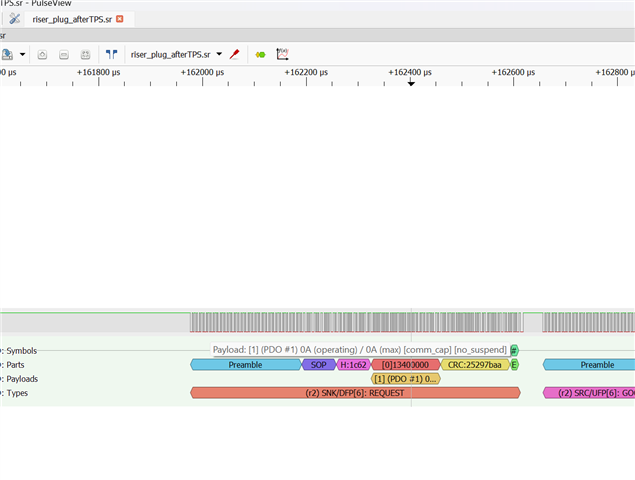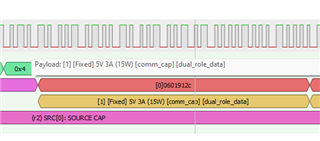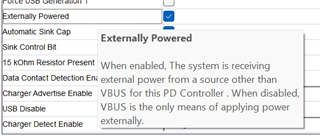Other Parts Discussed in Thread: TPS65987
Tool/software:
Hello app engineers,
I want to ask you for help, to save our 1 year of development of equipment for the high end film industry.
(follow up on this E2E - e2e.ti.com/.../tps65987d-docking-station---100w-source-usb-3-2-hub)
Introduction:
We are developing device where is implemented TPS65987D 100W only source with UFP data role, and USB hub IC USB7206 (Hub need UFP port config).
There is also implemented Pcie riser TH3P4 Lite which works independently of TPS65987D and USB7206. So, one cable going from TCPC and one cable to second macbook port going from Pcie riser. Block diagram below:
We found a problem when both USB-C cables are connected to Macbook. In my opinion there is some problem with my TCPC (TPS65987D) configuration.
Now I explain you behavior to better understand it.
1. Pcie riser don't want to allow TPS65987D to source the mackbook. When both USB-C cables are connected, Mackbook report only 15W charging. (Pcie riser don't have USB PD, so the 15W is probably 5V/3A. I tried these steps:
Firstly connected TPS65987D+USB7206 USB-C cable - Macbook reported 100W charging. Then I connected Pcie riser cable to macbook and it start reporting 15W charging. TPS65987D stop providing the power to macbook. TPS load switch is still closed but there is only 5V, not 20V. According to the E2E thread, you can see how I control the feedback of a USB PD buck-boost converter.
I tried to debug where might be a problem. I did some changes in my TCPC config but that not help. Than I tried to replace block TPS65987D+USB7206 with another USB PD sources. Check below.
2. I tried combination - Pcie riser + 60W wall adapter. In this case mackbook reported 60W charging. Pcie riser worked and also macbook was powered from wall adapter.
3. Next combination - Pcie riser + 100W PD source with MAX25432B. In this case mackbook reported 100W charging. Pcie riser worked and also macbook was powered from MAX25432.
4. Last combination - Pcie riser + Dell dock WD22TB4. In this case mackbook reported 90W charging. Pcie riser worked and also macbook was powered from Dell dock.
Here is my configuration project:
advanced_v2.4_DRP_MenicCTRL.pjt
I hope, something can be done about this and it is just a problem TCPC configuration. Something like: I don't have any "highest source priority" settings?
(I hope I didn't lose 1 year of my life developing with the wrong TCPC )
Thank you
Best regards,
Martin












